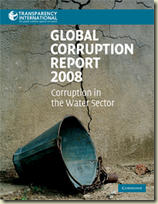From Transparency International's Global Corruption Report 2008:
Water crisis is undeniable and the corruption challenge it faces is urgent. More than 1 billion people worldwide have no guaranteed access to water and more than 2 billion are without adequate sanitation.

When corruption is part of the equation, the consequences for development and poverty reduction are dire. Corruption can increase the cost of connecting a household to a water network by more than 30 percent, raising the price tag for achieving the Millennium Development Goals for water and sanitation by a staggering US $48 billion.
Corruption in the water sector casts a wide and destructive net. Households pay with their health, as poor quality or non-existent water supplies increase their vulnerability to deadly diseases: in developing countries 80 percent of health problems can be linked to inadequate water and sanitation.
Corruption opens water policies to manipulation by powerful stakeholders. Bid-rigging and kick-backs inflate the cost of water infrastructure, bribery and embezzlement divert irrigation water away from small farmers and drain irrigation budgets. Corruption leads to unchecked water pollution and overuse, putting water supplies at risk – today and for future generations.
So what's the implication for the Nepalese economy? Note that water sector is one of the most easy breeding grounds for corrupt officials. Here is an article from The Kathmandu Post:
Nepal's development hangs on the proper utilization of its water resource. Water is the only resource that is abundantly available in Nepal and it is the resource that has less been under utilized. With around 77 percent of the population having access to some basic drinking water facilities and 46 percent having sanitary services; 49 percent served by electricity and 68 percent of the land having some access to irrigation facility, the potentiality for realising water sector is immense. If these figures are mind boggling, how about 78,000 Nepali children, including 50,000 girls, engaged in fetching water? Besides economics, fighting corruption in water sector is also a moral issue.
With so much leakage in the supply of electricity and drinking water, combating corruption in water sector is a huge challenge for Nepal. Due to corruption, waste and inefficiency, we have the most expensive supply of electricity and water.